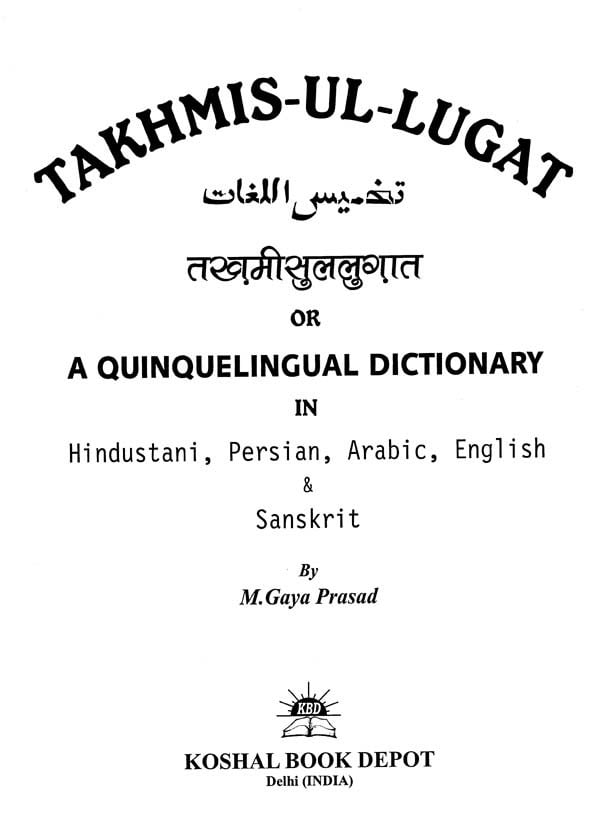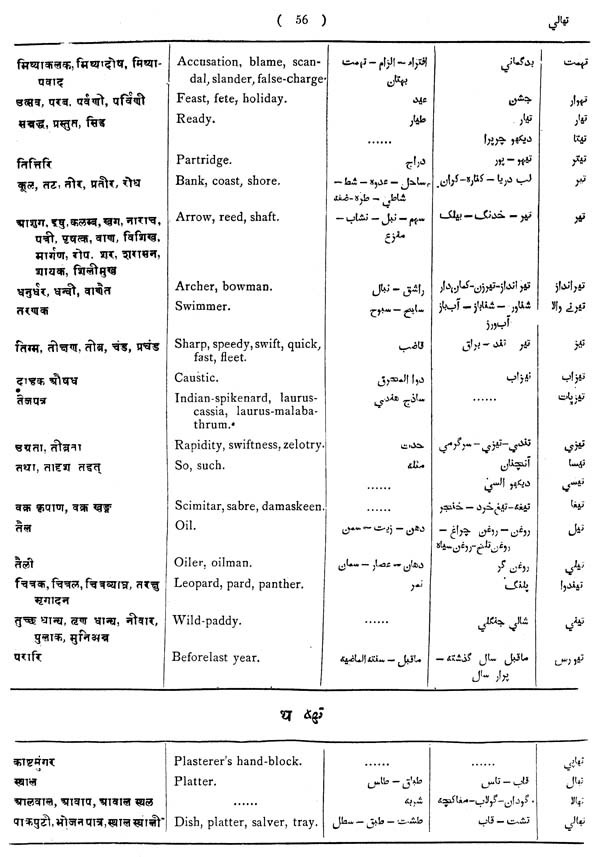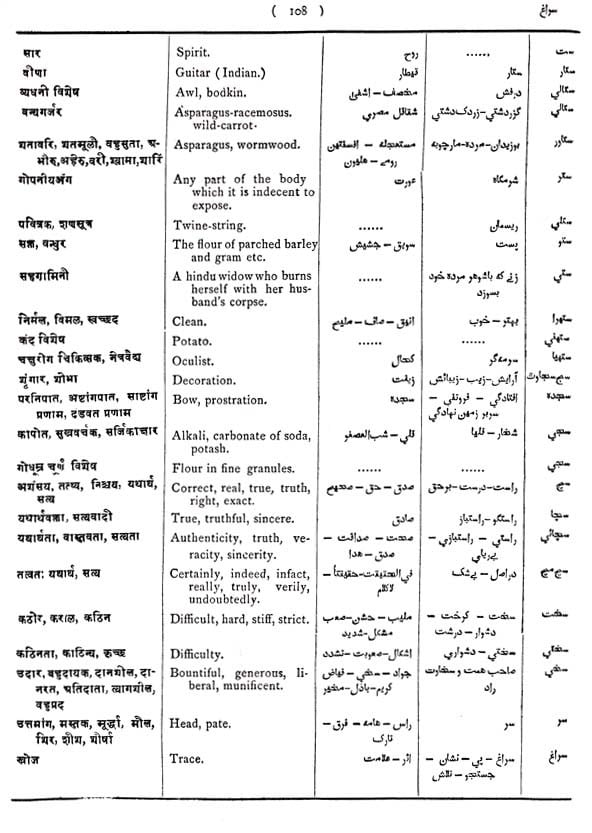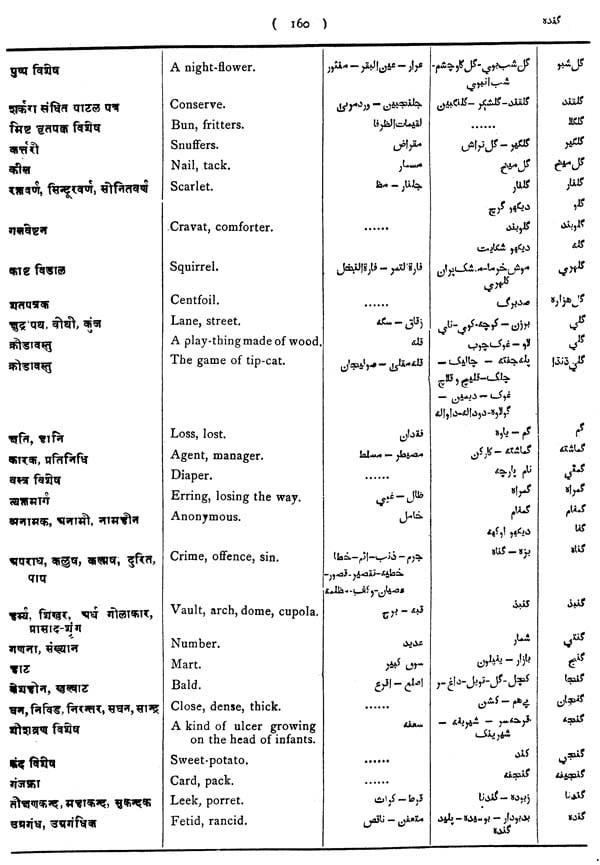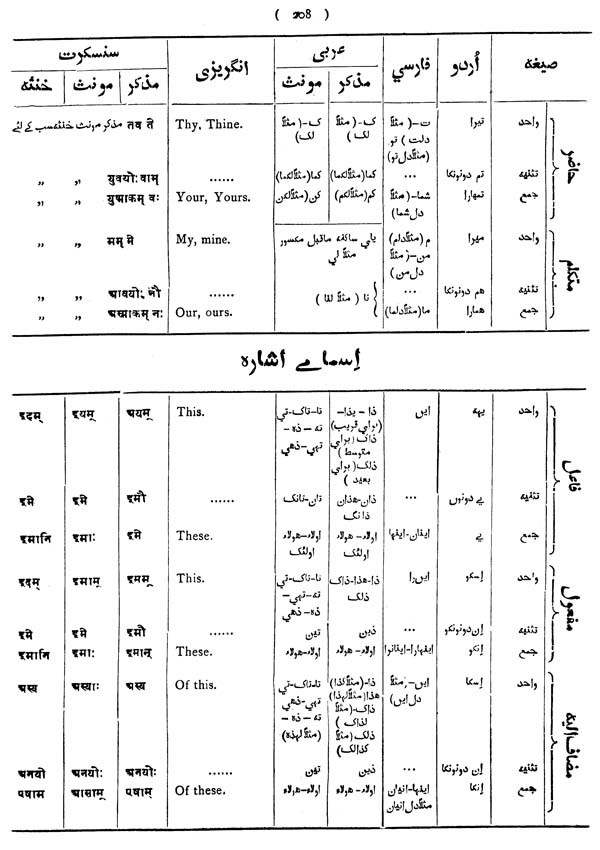
तख़मीसुललुग़ात: Takhmis -ul - Lugat (A Quinquelingual Dictionary)
Book Specification
| Item Code: | UAT059 |
| Author: | Gaya Prasad |
| Publisher: | Koshal Book Depo, Delhi |
| Language: | Hindi, Persian, Arabic, English and Sanskrit |
| Edition: | 2008 |
| ISBN: | 8186049096 |
| Pages: | 285 |
| Cover: | HARDCOVER |
| Other Details | 12.00 X 9.00 inch |
| Weight | 1.15 kg |
Book Description
Dictionary almost in every developed language, specially from English to any other language for Indian languages to English are easily available. But a dictionary consisting five languages in one volume is hardly traceable. The present dictionary is titled "Takhmis-Ul-Lugat" where Takhmis means "Five" and "Lugat" implies dictionary since the dictionary is based on five language it is called as Quinguelingual Dictionary in which a Hindustani (Urdu) word may be traced out in Persian, Arabic, English and Sanskrit. Contents of the dictionary are numerous, vast and optimum in use. The dictionary includes all the letters, various conjugation words, numericals, names, weekdays, months, planet and most importantly zodiac signs. In addition subjects like Orthography, Etymology, Syntax, Prosody and topics like Abjad system have been also covered by the book. This dictionary is one of the most appropriate and useful sources of study to understand the meaning of an Urdu word into five other language and is an appropriate linking source to associate various language into one book.
M.Gaya Prasad was born at Azamgarh (Uttar Pradesh) in the year 1835. His father Munshi Girdhari Lal, a wellknown chief of Ghoshi village Distt. Azamgarh (Uttar Pradesh) served as a police officer under the erstwhile British Government in India. M.Gaya Prasad was a government servant worked under various capacities in revenue department and was closely associated with Mr. Charles Charter, the then chief of revenue department. M.Gaya Prasad sought his basic education in Persian, Arabian and Urdu in a at Azamgarh. Further he went to Kolkata for higher education and passed intermediate examination with distinction in English, Hindi, Sanskrit, Geography and Urdu in 1854 and thereafter entered into the services of British Government at Calcutta. He became a Revenue officer/ Tahsildar at the age of 20. During his tenure of service from 1855-1895, he travelled Rangoon, Lahore, Mumbai, Kolkata, Chennai, Delhi, Lucknow, Varanasi, Allahabad and finally retired from the service in 1895 at Bareilly. He himself explained the necessacity for compiling such a dictionary in five languages. However after his retirement he devoted his entire life time to this work and ultimately published this dictionary in five languages in the year 1910. After this. M.Gaya Prasad started writing another book on Indian History and Culture covering a vast period from early historical times to the end of the Mughal period. But due to unforeseen circumstances he not complete this work and expired in 1914 at Azamgarh. Leaving behind three sons and two daughters.
Much attention has been paid to the development and writing of Dictionaries almost in every developed language, specially, from English to any other language, from Indian language to English. Even Persian, Arabic, Urdu and Hindi words can also be understood separately. All these efforts have been made mostly bilingual or vice versa. But a dictionary consisting of five languages in one volume is hardly traceable. During early 20 century, when India was under British rule, the language like, English, Persian, Arabic, Sanskrit and Urdu were the main sources of expression in day-to-day life even Persian Urdu and English were the court languages during Pre-Independent India. In such an atmosphere, the author of this dictionary dared to compile the book based on five languages. In fact the man's creative genius is manifested in many ways but the art of dictionary writing is the most wonderful, invaluable and the most appealing. Through it the distinctive qualities of a word can be identified in its right direction. Through it the link between past and present can be established with the help of the dictionary: At the same time the art of dictionary writing is not an easy job it requires perfection on the subject. The respiratory of humanity also played an important role in the progress, development, dissemination and propagation of different art and literature as well as scientific research. This unique dictionary was published about one hundred years ago but still it is as useful as it was important a century back
**Contents and Sample Pages**
